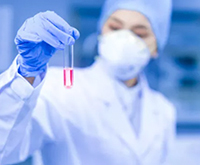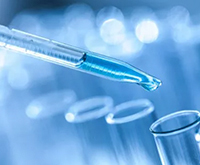Proprotein Convertase Subtilisin/Kexin Type 9 (PCSK9)
Proprotein Convertase Subtilisin/Kexin type 9 (PCSK9) is a serine protease involved in cholesterol homeostasis.
Proprotein Convertase Subtilisin/Kexin type 9 (PCSK9) plays an essential role in regulating cholesterol homeostasis.
By binding to hepatic low-density lipoprotein (LDL) receptors and promoting lysosomal degradation, PCSK9 reduces LDL uptake, increasing LDL cholesterol concentrations.
Gain-of-function mutations in PCSK9 associated with high LDL cholesterol and premature cardiovascular disease have involved the pathophysiology of autosomal-dominant familial hypercholesterolemia. In contrast, the more commonly expressed loss-of-function mutations in PCSK9 are relevant to reduced LDL cholesterol and cardiovascular disease risk.

Proprotein Convertase Subtilisin/Kexin Type 9 (PCSK9) Products
| Antibody | Application |
| Anti-human PCSK9 Monoclonal Antibody | For immunodiagnostic: ELISA, LFA, CLIA |
| Antigen | Application |
| Recombinant PCSK9 Protein | For immunodiagnostic: ELISA, LFA, CLIA |
PCSK9 Intro
PCSK9 is a liver-derived secreted protein. As a serine protease, in addition to degrading LDLR and increasing blood LDL levels, PCSK9 has many other biological functions, such as participating in nervous system development, neuronal apoptosis and regulating sodium channels, islet cell function, etc. . As neuronal apoptosis-regulating invertase, PCSK9 participates in liver regeneration and regulates neuronal apoptosis. It affects the internalization of LDL by reducing the number of LDLR on hepatocytes; LDL cannot be cleared, resulting in hypercholesterolemia. Studies have shown that PCSK9 levels are significantly correlated with cholesterol, ox-LDL, and triglycerides.
PCSK9 Inhibitors
Previous clinical studies have found that most patients with coronary heart disease or at high risk of coronary heart disease have statin intolerance, but PCSK9 inhibitors can be safely and effectively used in such patients.
PCSK9 inhibitors are a class of monoclonal antibodies that can lower low-density lipoprotein cholesterol (LDL-C), recognized as a significant risk factor for cardiovascular disease (CVD). PCSK9 inhibitors offer an entirely new treatment modality to combat LDL-C and are seen as the most significant advancement in lipid-lowering after statins.
- Cardiac Markers
-
Tumor Marker
-
PGII
-
G17
- CA50
-
CA125
- CA242
-
CA15-3
- CA19-9
- CA72-4
-
Pepsinogens I (PGI)
-
Human Epididymis 4 (HE4)
- Prostate-Specific Antigen (PSA)
- Squamous Cell Carcinoma (SCC)
- Neuron-Specific Enolase (NSE)
- Cytokeratin 19 Fragment (CYFRA21-1)
- Human Progastrin-releasing Peptide (ProGRP Tumor Marker)
- Protein Induced by Vitamin K Absence or Antagonist-II (PIVKA II Tumor Marker)
- Alpha-fetoprotein(AFP)
-
CEA
-
Human Chitinase 3-like 1
-
PGII
- Inflammatory Marker
- Infectious Disease
- Hormones
- Thyroid Function
- Glucose Metabolism
- Bone Marker
- Others
-
Heterophilic Blocking Reagent
- Animal Diagnostics

















